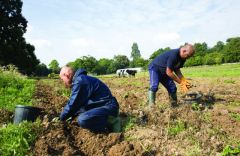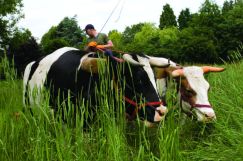Having sown the seeds, and settling into a regular watering regime, there isn’t much to be done while waiting for germination of the seeds. That being the case, I decided to go a little deeper into the various aspects of sustainable gardening and decided to look into the topic of fertilizer by doing a little comparison between organic and synthetic fertilizer, but by widening the scope to include farming practices as well. Synthetic fertilizer are mainly derived from hydrocarbons (natural gas) through chemical reactions, while organic fertilizer are those from naturally occurring matter, such as manure, compost, etc.
The reason I chose to start with fertilizer is because that is the industry that I come from. Granted, I may have a certain bias towards it, but the point was to determine what are the problems associated with it and what can be done.
The main problem often associated with the use of synthetic fertilizer is chemical/nitrogen run-off into lakes and other water bodies leading excessive growth of algae, also known as euthrophication. Other problems include soil acidification and degradation of the soil fertility, particularly in cases of over-application due to depletion of other naturally occurring minerals.
Organic fertilizer on the other hand does not have the problem above due to its nature of slow release of its nitrogen compound, as well as having a fairly diverse mix of components. Then there are the other advantages of having tastier and more nutritional produce (although these have yet to be scientifically proven), and the fact that it also up-cycles waste, through composting (I had to throw the word in there).
Its worth noting, however, that organic fertilizer currently accounts for about 2% of the total fertilizer market, which means that we are far from producing enough to feed the planet. Also, organic fertilizer is essentially what men used before Fritz Haber invented the Haber process, that eventually led to the so-called Green Revolution in agriculture, when the global population was much smaller than it is today. The ammonia production facility that I worked at produced close to half a million tons per annum, which is 0.25% of the global annual production. That from a site that occupies less than 1 square km. The company motto used to be Ammonia – the essence of life.

Much of the problems related to synthetic fertilizer is due to over-application and this is most likely a result of subsidies. In India for instance, urea is so cheap that farmers tend to apply 8 times the recommended amount (in terms of Nitrogen to phosphorus content. The issue is complex and deals with politics at its most basic level. The soil has deteriorated significantly and is affecting crop yields, and this leads to a situation where farmers unknowingly apply even more urea to increase its fertility. There are other issues related to subsidies – such as unfair competition between rich and poor countries but I will not go into these, at least not today.
Therefore, to correct much of the problem, a good deal of enhanced agricultural policy making would be required. As with any industry, subsidy distorts the market and creates inefficiencies and we should slowly move away from these. The money should be spent on other more beneficial things, such as farmer education and the like.
Also, although we may not be able to transition to organic fertilizer immediately, we should take every opportunity to do so. Gardening is one such since it is more personal and not related to world hunger issues. And based on my previous experience with compost (I am still amazed that it did not stink), I would recommend everybody who has a garden to carry out some composting. It certainly requires more effort, and would not satisfy those seeking instant gratification, but it would definitely be rewarding. And if this can be done on a greater scale, such as farming, then all the better. One such community that actively pursues sustainable farm are the Hare Krishna community, who through their cow protection program have access to vast amounts of cow manure )as organic as it could be). I’m planing to make a trip to the farm and if anybody is interested in joining, do let me know.


1 thought on “The essence of life”